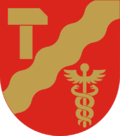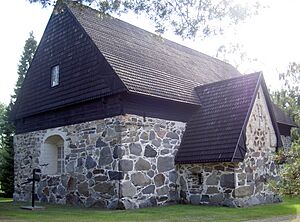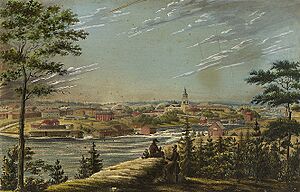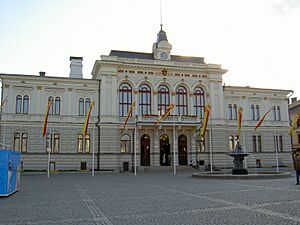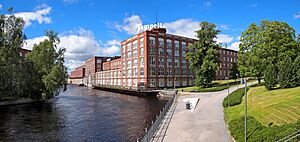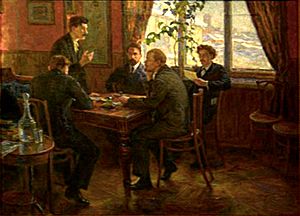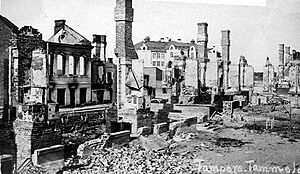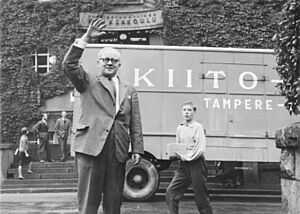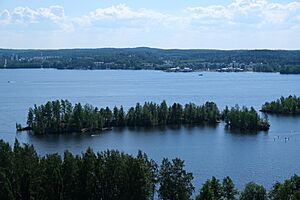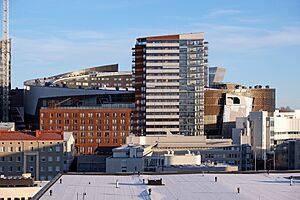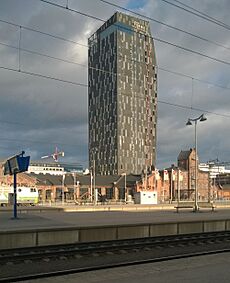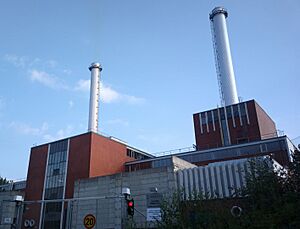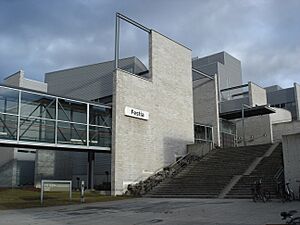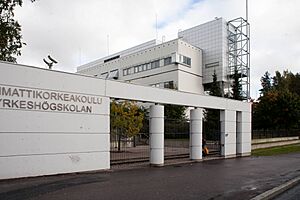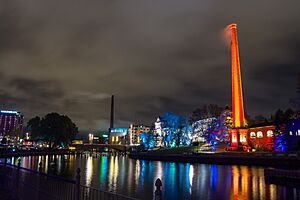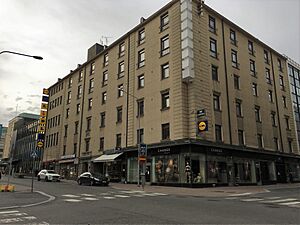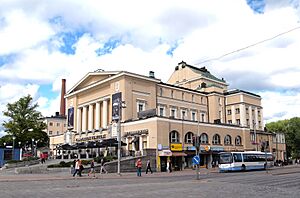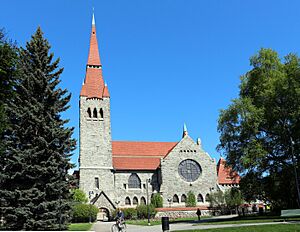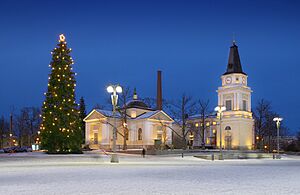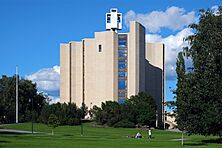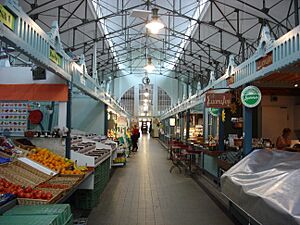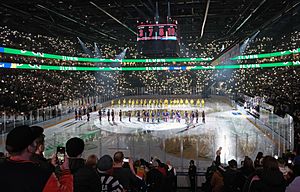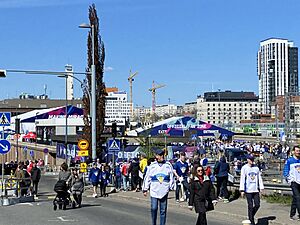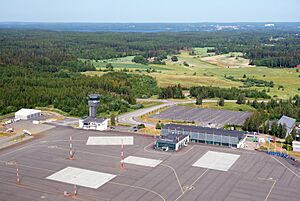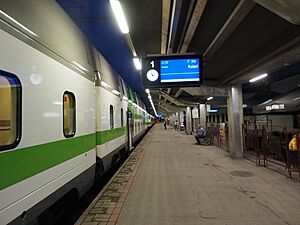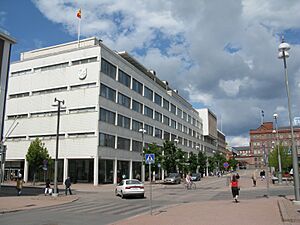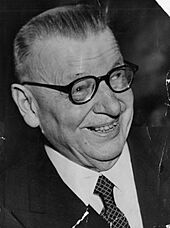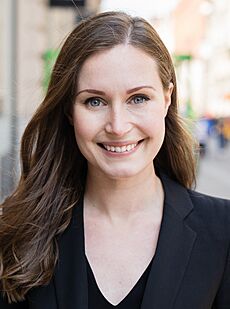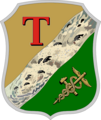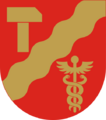Tampere facts for kids
Quick facts for kids
Tampere
Tammerfors (Swedish)
|
||
|---|---|---|
|
City
|
||
| Tampereen kaupunki Tammerfors stad City of Tampere |
||
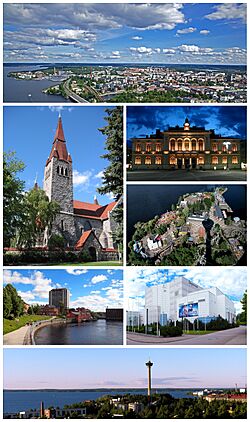
Clockwise from top: the cityscape (viewed from Näsinneula); Tampere City Hall; Särkänniemi (from Näsinneula); Tampere Hall; the skyline with Näsinneula; Tammerkoski from Hämeensilta Bridge; and the Cathedral.
|
||
|
||
| Nickname(s):
Manchester of the North, Nashville of the North, Manse (“Manchester” in Finnish), Nääsville (“Nashville” in Finnish), Sauna Capital of the World
|
||

|
||
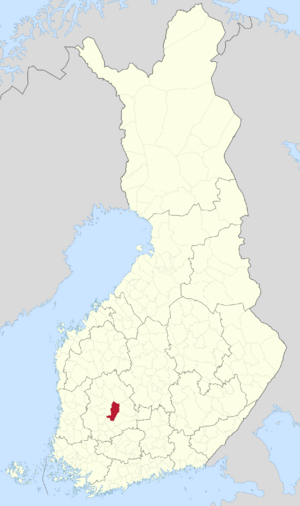
Location of Tampere in Finland
|
||
| Country | ||
| Region | ||
| Sub-region | Tampere | |
| Metropolitan area | Tampere | |
| City rights | 1 October 1779 | |
| Area
(2018-01-01)
|
||
| • City | 689.59 km2 (266.25 sq mi) | |
| • Land | 524.89 km2 (202.66 sq mi) | |
| • Water | 164.56 km2 (63.54 sq mi) | |
| • Urban | 258.52 km2 (99.82 sq mi) | |
| Area rank | 166th largest in Finland | |
| Population
(2023-12-31)
|
||
| • City | 255,050 | |
| • Rank | 3rd largest in Finland | |
| • Density | 485.91/km2 (1,258.5/sq mi) | |
| • Urban | 334,112 | |
| • Urban density | 1,211.0/km2 (3,136/sq mi) | |
| • Metro | 148,271 | |
| Demonym(s) | tamperelainen (Finnish) tammerforsare (Swedish) Tamperean (English) |
|
| Population by native language | ||
| • Finnish | 89% (official) | |
| • Swedish | 0.5% | |
| • Others | 10.4% | |
| Population by age | ||
| • 0 to 14 | 13.3% | |
| • 15 to 64 | 67.5% | |
| • 65 or older | 19.2% | |
| Time zone | UTC+02:00 (EET) | |
| • Summer (DST) | UTC+03:00 (EEST) | |
Tampere is a lively city in Finland and the main city of the Pirkanmaa region. It's located in the Finnish Lakeland, a beautiful area with many lakes. Tampere is the most populated inland city in all the Nordic countries.
The city is built between two lakes, Näsijärvi and Pyhäjärvi. The water level between them is different by about 18 meters. The Tammerkoski rapids connect these lakes. These rapids have been a key power source for a long time, even for making electricity today.
Tampere is sometimes called the "Manchester of the North." This is because it used to be a big center for factories in Finland. This history gave it the Finnish nickname "Manse." Tampere is also known as the "Sauna Capital of the World" because it has the most public saunas anywhere!
Helsinki is about 160 kilometers south of Tampere. You can get there quickly by train in about 1 hour and 31 minutes. Turku, another big city, is about the same distance away. Tampere–Pirkkala Airport is busy, with many passengers using it each year. Tampere is also a major hub for three main Finnish highways. The Tampere light rail started running in 2021, making it easier to get around.
Many people think Tampere is the most popular city in Finland. It has grown a lot in the 21st century because it's a very attractive place to live. In 2023, Tampere won a big award at the Smart City World Congress in Barcelona. It was recognized for using technology to help its residents and businesses.
Contents
- What's in a Name? The Etymology of Tampere
- A Look Back: Tampere's History
- Tampere's Geography and Landscape
- Tampere's Cityscape and Buildings
- Tampere's Economy and Jobs
- Energy and Environment in Tampere
- People and Languages in Tampere
- Education and Learning in Tampere
- Arts and Culture in Tampere
- Main Sights and Attractions
- Events and Festivals
- Sports in Tampere
- Getting Around: Transport in Tampere
- City Government
- Famous People from Tampere
- International Connections
- Images for kids
- See also
What's in a Name? The Etymology of Tampere
The name Tampere comes from the Tammerkoski rapids. In Swedish, both the city and the rapids are called Tammerfors. The exact meaning of the "Tammer-" part of the name has been a topic of discussion.
One popular idea is that it comes from an old Sami language word, *Tëmpël(kōškë). Here, *tëmpël means "deep, slow part of a stream" and *kōškë means "rapids." This makes sense because of the Tammerkoski rapids. Other ideas suggest it might come from Swedish words related to "milldam" or "fat-bellied," possibly describing the rapids. Some even link it to an old Swedish word for "Ember Days," which are special days in the Christian calendar.
City Symbols: The Coat of Arms
Tampere has a special symbol called a coat of arms. The first one was designed in 1838. The current one was created in 1960 by Olof Eriksson. Changing the coat of arms was a big deal at the time, and some people wanted the old one back.
The current coat of arms is red. It has a wavy gold line in the middle, which stands for the Tammerkoski rapids. Above the line, there's a gold hammer, shaped like the letter 'T' for Tampere. This hammer shows the city's early factories. Below the line, there's a gold caduceus, which is a symbol for trade. The colors are the same as the coat of arms for the Pirkanmaa region.
A Look Back: Tampere's History
Early Settlements and Markets
People first settled around Tammerkoski in the 7th century. They were farmers from the west of the region. For many centuries, the population stayed small. By the 16th century, the villages of Messukylä and Takahuhti were the largest settlements.
The Pispala area had a market for hundreds of years. In the 17th century, the first factories in the Pirkanmaa region were mostly watermills and sawmills. Later, in the 18th century, other industries started to grow.
How Tampere Became a City and Industrial Hub
Before Tampere was founded, the nearby area of Pirkkala was more important for local government. But in the 18th century, a pastor named Erik Edner suggested building a town by the Tammerkoski Canal. Tampere officially became a market town in 1775 and then a full city on October 1, 1779. It was a small town then, and its people were mostly farmers. Since farming was not allowed in the city, people started to focus on trade and crafts. By 1809, Tampere had less than a thousand people.
In the 19th century, Tampere grew into a major industrial center. The Finlayson textile factory, started in 1820 by James Finlayson, was very important. By 1850, it employed about 2,000 people. Other big factories like Tampella and Frenckell paper mill also opened. Tampere's population grew very fast, from about 7,000 in 1870 to 36,000 in 1900. Many people working in factories were women.
The city also became more modern. It was the first Nordic city to have electric lighting for everyone in 1882. A railway connection to Helsinki opened in 1876. The famous Nokia Corporation also started in the Tammerkoski area. It began in 1865 when Fredrik Idestam built a pulp mill by the rapids.
Important Moments in Tampere's History
Tampere was a key place for many political events in the early 1900s. In 1905, a big meeting of the Russian Social Democratic Labour Party happened here. Leaders like Vladimir Lenin attended. Also, in November 1905, a famous speech called the Red Declaration was given in Keskustori.
After Finland became independent, Tampere played a big part in the Finnish Civil War in 1918. It was an important city for the Red side because it had many factories and workers. White forces, led by General Mannerheim, captured the city after the Battle of Tampere in April 1918.
During the Winter War (1939-1940), the Soviet Union bombed Tampere several times. This was because Tampere was a major railway hub and had factories that made weapons.
Tampere Today: Growth and Change
After World War II, Tampere grew by adding nearby areas. The city's population passed 100,000 in 1950. Tampere was known for its textile and metal industries. But in the 1990s, these changed to information technology and telecommunications. The Hermia technology center in Hervanta is now home to many tech companies.

Finland's second TV channel, Yle TV2, started broadcasting from Tampere in 1965. Tampere also became a university city when the Social University moved here from Helsinki in 1960. It became the University of Tampere in 1966.
In the early 1990s, many factories in Tampere faced problems when the Soviet Union collapsed. Companies like Finlayson had to reduce their operations, and Tampella went out of business. However, the empty factory buildings were later used for new purposes. Today, Tampere is known for its strong IT companies, including Nokia's research and development teams.
Tampere's Geography and Landscape
Tampere is part of the Pirkanmaa region. It is surrounded by other towns like Kangasala and Nokia. The city has 180 lakes larger than 10,000 square meters, and water covers 24% of its area. The lakes formed about 7,500–8,000 years ago.
The city center is between three lakes: Näsijärvi, Pyhäjärvi, and the smaller Iidesjärvi. The Tammerkoski rapids, which connect the two main lakes, were a key reason for the city's location.
One of Tampere's most amazing natural features is the Pyynikki Ridge (Pyynikinharju). It's a huge gravel ridge formed during the Ice Age. It rises 160 meters above sea level and is thought to be the largest gravel ridge in the world.
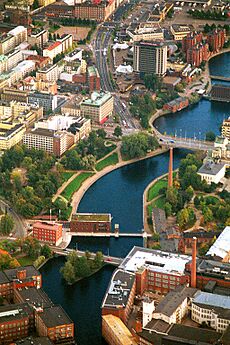
The center of Tampere has a grid pattern of streets. Hämeenpuisto is a park road that runs north-south. The main street, Hämeenkatu, goes east-west from the Tampere Central Station and crosses Tammerkoski on the Hämeensilta bridge. Tampere's central square is on the western side of Tammerkoski.
City Areas and Divisions
Tampere is divided into seven statistical areas, which include many districts and suburbs. In total, there are 111 statistical areas. These areas help with city planning and statistics.
Tampere's Climate
| Weather chart for Tampere | |||||||||||||||||||||||||||||||||||||||||||||||
|---|---|---|---|---|---|---|---|---|---|---|---|---|---|---|---|---|---|---|---|---|---|---|---|---|---|---|---|---|---|---|---|---|---|---|---|---|---|---|---|---|---|---|---|---|---|---|---|
| J | F | M | A | M | J | J | A | S | O | N | D | ||||||||||||||||||||||||||||||||||||
|
41
-3
-10
|
29
-4
-11
|
31
1
-7
|
32
8
-1
|
41
15
4
|
66
20
9
|
75
22
12
|
72
20
10
|
58
14
6
|
60
8
2
|
51
2
-3
|
42
-2
-8
|
||||||||||||||||||||||||||||||||||||
| temperatures in °C precipitation totals in mm |
|||||||||||||||||||||||||||||||||||||||||||||||
|
Imperial conversion
|
|||||||||||||||||||||||||||||||||||||||||||||||
Tampere has a climate with four clear seasons. Winters are cold, with average temperatures below -3°C from December to February. It can get as cold as -30°C. Summers are cool to warm. Snow usually covers the ground for 4–5 months, from late November to early April. Even though it's far north, the average yearly temperature is quite mild.
| Climate data for Tampere Härmälä (TMP), elevation: 85 m (279 ft), 1991–2020 normals, extremes 1900–present (Härmälä and Tampella) | |||||||||||||
|---|---|---|---|---|---|---|---|---|---|---|---|---|---|
| Month | Jan | Feb | Mar | Apr | May | Jun | Jul | Aug | Sep | Oct | Nov | Dec | Year |
| Record high °C (°F) | 8.4 (47.1) |
9.2 (48.6) |
15.6 (60.1) |
24.3 (75.7) |
29.6 (85.3) |
33.2 (91.8) |
33.1 (91.6) |
32.1 (89.8) |
26.7 (80.1) |
19.4 (66.9) |
13.3 (55.9) |
10.5 (50.9) |
33.1 (91.6) |
| Mean daily maximum °C (°F) | −2.5 (27.5) |
−2.5 (27.5) |
2.1 (35.8) |
8.8 (47.8) |
15.6 (60.1) |
19.7 (67.5) |
22.5 (72.5) |
20.7 (69.3) |
14.9 (58.8) |
7.8 (46.0) |
2.6 (36.7) |
−0.5 (31.1) |
9.1 (48.4) |
| Daily mean °C (°F) | −5.2 (22.6) |
−5.7 (21.7) |
−1.9 (28.6) |
3.9 (39.0) |
10.1 (50.2) |
14.6 (58.3) |
17.3 (63.1) |
15.6 (60.1) |
10.6 (51.1) |
4.9 (40.8) |
0.7 (33.3) |
−2.7 (27.1) |
5.2 (41.3) |
| Mean daily minimum °C (°F) | −8.3 (17.1) |
−9.1 (15.6) |
−6.0 (21.2) |
−0.9 (30.4) |
4.1 (39.4) |
9.0 (48.2) |
12.2 (54.0) |
10.8 (51.4) |
6.6 (43.9) |
2.0 (35.6) |
−1.5 (29.3) |
−5.4 (22.3) |
1.1 (34.0) |
| Record low °C (°F) | −37.0 (−34.6) |
−36.8 (−34.2) |
−29.6 (−21.3) |
−19.6 (−3.3) |
−7.3 (18.9) |
−2.8 (27.0) |
1.8 (35.2) |
−0.4 (31.3) |
−6.7 (19.9) |
−14.8 (5.4) |
−22.5 (−8.5) |
−34.2 (−29.6) |
−37.0 (−34.6) |
| Average precipitation mm (inches) | 41 (1.6) |
30 (1.2) |
29 (1.1) |
32 (1.3) |
36 (1.4) |
66 (2.6) |
74 (2.9) |
65 (2.6) |
55 (2.2) |
57 (2.2) |
51 (2.0) |
46 (1.8) |
582 (22.9) |
| Average snowfall cm (inches) | 32.3 (12.7) |
31.4 (12.4) |
29.5 (11.6) |
13.9 (5.5) |
1.6 (0.6) |
0.1 (0.0) |
0 (0) |
0 (0) |
0 (0) |
3.3 (1.3) |
13.1 (5.2) |
27.2 (10.7) |
152.4 (60) |
| Average precipitation days (≥ 1 mm) | 10 | 8 | 8 | 7 | 7 | 9 | 11 | 9 | 9 | 10 | 10 | 11 | 109 |
| Average relative humidity (%) | 90 | 87 | 82 | 70 | 63 | 66 | 69 | 76 | 82 | 87 | 91 | 92 | 80 |
| Source 1: weatheronline.co.uk | |||||||||||||
| Source 2: FMI [1] (precipitation, record highs and lows) | |||||||||||||
| Climate data for Tampere–Pirkkala Airport (1991-2020 normals, extremes 1979-present) | |||||||||||||
|---|---|---|---|---|---|---|---|---|---|---|---|---|---|
| Month | Jan | Feb | Mar | Apr | May | Jun | Jul | Aug | Sep | Oct | Nov | Dec | Year |
| Record high °C (°F) | 8.0 (46.4) |
9.4 (48.9) |
14.9 (58.8) |
24.2 (75.6) |
29.3 (84.7) |
33.0 (91.4) |
32.5 (90.5) |
31.3 (88.3) |
26.6 (79.9) |
18.3 (64.9) |
13.2 (55.8) |
10.3 (50.5) |
33.0 (91.4) |
| Mean maximum °C (°F) | 3.9 (39.0) |
3.9 (39.0) |
9.0 (48.2) |
17.7 (63.9) |
24.4 (75.9) |
26.8 (80.2) |
28.2 (82.8) |
26.6 (79.9) |
21.2 (70.2) |
13.7 (56.7) |
8.5 (47.3) |
4.8 (40.6) |
29.2 (84.6) |
| Mean daily maximum °C (°F) | −2.7 (27.1) |
−2.8 (27.0) |
1.7 (35.1) |
8.5 (47.3) |
15.2 (59.4) |
19.6 (67.3) |
22.2 (72.0) |
20.5 (68.9) |
14.7 (58.5) |
7.5 (45.5) |
2.3 (36.1) |
−0.7 (30.7) |
8.8 (47.9) |
| Daily mean °C (°F) | −5.6 (21.9) |
−6.0 (21.2) |
−2.3 (27.9) |
3.6 (38.5) |
9.8 (49.6) |
14.3 (57.7) |
17.1 (62.8) |
15.5 (59.9) |
10.4 (50.7) |
4.6 (40.3) |
0.3 (32.5) |
−3.2 (26.2) |
4.9 (40.8) |
| Mean daily minimum °C (°F) | −8.6 (16.5) |
−9.3 (15.3) |
−6.3 (20.7) |
−1.0 (30.2) |
3.9 (39.0) |
8.9 (48.0) |
12.1 (53.8) |
10.8 (51.4) |
6.5 (43.7) |
1.7 (35.1) |
−1.9 (28.6) |
−5.8 (21.6) |
0.9 (33.7) |
| Mean minimum °C (°F) | −22.9 (−9.2) |
−22.5 (−8.5) |
−17.3 (0.9) |
−8.5 (16.7) |
−3.1 (26.4) |
2.1 (35.8) |
5.9 (42.6) |
4.1 (39.4) |
−1.3 (29.7) |
−7.1 (19.2) |
−11.3 (11.7) |
−17.6 (0.3) |
−26.0 (−14.8) |
| Record low °C (°F) | −35.8 (−32.4) |
−31.8 (−25.2) |
−29.1 (−20.4) |
−14.8 (5.4) |
−7.2 (19.0) |
−3.0 (26.6) |
1.5 (34.7) |
−0.4 (31.3) |
−7.0 (19.4) |
−16.4 (2.5) |
−21.9 (−7.4) |
−33.0 (−27.4) |
−35.8 (−32.4) |
| Average relative humidity (%) | 91 | 88 | 80 | 70 | 64 | 68 | 72 | 77 | 83 | 88 | 92 | 92 | 80 |
| Source 1: https://www.ilmatieteenlaitos.fi/ilmastollinen-vertailukaus | |||||||||||||
| Source 2: https://kilotavu.com/asema-taulukko.php?asema=101118 | |||||||||||||
Temperature Records in Tampere
Here are some temperature records for Tampere and the nearby Tampere–Pirkkala Airport:
Highest Temperatures in Tampere
| Tampere highest temperatures by month | |||
| Month | °C | Date | Location |
|---|---|---|---|
| June | 33.2° | 22 June 2021 | Härmälä |
| July | 33.1° | 9 July 1914 | Härmälä |
| August | 32.1° | 10 August 1912 | Härmälä |
Highest temperatures at the Tampere–Pirkkala Airport since 1980:
| Pirkkala Airport highest temperatures by month | |||
| Month | °C | Year | |
|---|---|---|---|
| January | 8.0° | 2007 | |
| February | 9.4° | 1990 | |
| March | 14.9° | 2007 | |
| April | 24.2° | 1998 | |
| May | 29.3° | 2014 | |
| June | 31.7° | 1999 | |
| July | 32.5° | 2010 | |
| August | 31.1° | 1992 | |
| September | 24.8° | 1999 | |
| October | 17.5° | 1984 | |
| November | 12.4° | 2015 | |
| December | 10.3° | 2015 | |
Lowest temperatures in Pirkanmaa:
| Tampere lowest temperatures by month | |||
| Month | °C | Date | Location |
|---|---|---|---|
| January | −38.5° | 9 January 1987 | Aitoneva, Kihniö |
| February | −40.9° | 3 February 1966 | Mouhijärvi |
Lowest temperatures at the Tampere–Pirkkala Airport since 1980:
| Pirkkala Airport lowest temperatures by month | |||
| Month | °C | Year | |
|---|---|---|---|
| January | −35.8° | 1987 | |
| February | −31.8° | 2007 | |
| March | −29.1° | 1981 | |
| April | −14.8° | 1988 | |
| May | −7.2° | 1999 | |
| June | −3.0° | 1984 | |
| July | 1.5° | 1987 | |
| August | −0.4° | 1984 | |
| September | −7.0° | 1986 | |
| October | −16.4° | 1992 | |
| November | −22.0° | 1990 | |
| December | −33.0° | 1995 | |
Tampere's Cityscape and Buildings
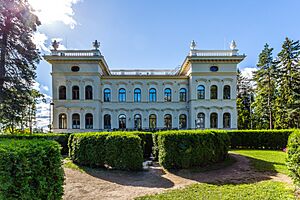
Tampere has buildings from many different time periods and styles. The Old Stone Church of Messukylä is a rare example of medieval architecture. You can see Neoclassicism from the early 1800s in the Old Church of Tampere.
Later, buildings like the Tampere Cathedral and Tampere Central Fire Station showed a style called Romantic nationalism. Many old factory buildings along Tammerkoski, like the Finlayson and Tampella factories, are made of red brick. This gives the city a unique look.
Modern Buildings and City Growth
The style called Functionalism became popular in the 1930s. Buildings like the Tampere Central Station were built in this style. After World War II, Tampere continued to grow. Modern buildings include the University of Tampere and Kaleva Church.
Since the 2010s, Tampere's city center has been updated. The "Tampere Deck" project includes a new multi-purpose arena and tall buildings near the central railway station. A light rail network has also been built in the city center. There are even plans for new residential areas on artificial islands in the lakes.
Tampere's Economy and Jobs
The Tampere region, called Pirkanmaa, has about 509,000 residents. Around 244,000 people have jobs here. The region's economy was worth 28 billion euros in 2014.
Tampere is strong in areas like mechanical engineering, automation, and information and communication technologies. Health and biotechnology are also important. In September 2023, the unemployment rate was 9.2%. Most jobs (70%) are in the service sector, like shops and offices. Less than 20% are in manufacturing. Many people who work in Tampere live in nearby towns.
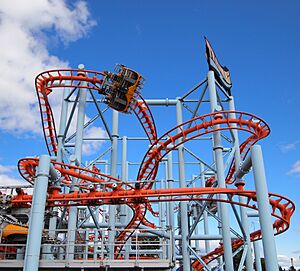
Tourism is a big part of Tampere's economy. In 2022, tourism brought in over 562 million euros. The most popular place to visit is Särkänniemi amusement park, which had about 552,000 visitors in 2023. Tampere is the second most popular city in Finland for hotel stays, after Helsinki. In 2023, there were 1.4 million overnight stays in Tampere hotels.
The city's finances are strong. In 2023, Tampere had a financial result of 55.3 million euros. Most of the city's money comes from taxes. The municipal tax rate in Tampere for 2024 is 7.6%.
Energy and Environment in Tampere
Tampereen Energiantuotanto, part of Tampereen Energia, produces electricity and heating for the city. In 2013, they generated 1,254 GWh of electricity and 2,184 GWh of district heating. The power stations at Naistenlahti and Lielahti produce most of this energy.
By 2023, about 80% of the district heating came from renewable energy sources. The goal was to stop using peat completely that year. They use Hydropower, wood, and nuclear power, as well as mixed waste (half of which is renewable). Emissions from energy production have gone down in the 21st century because of more renewable energy and modernizing power plants.
Water and Waste Management
Most of Tampere's drinking water (75%) comes from surface water, and 25% comes from groundwater. A lot of the surface water comes from Lake Roine. Tampereen Vesi also manages water in Pirkkala.
Tampereen Vesi handles almost all the wastewater from Tampere and nearby towns. In 2023, they treated 33 million cubic meters of wastewater. A new central treatment plant in Sulkavuori is set to open in 2025. It will be a joint project for several municipalities.
Pirkanmaan Jätehuolto manages waste management in Tampere. They have facilities in Nokia and Tampere.
People and Languages in Tampere
Population Growth
| Historical population | ||
|---|---|---|
| Year | Pop. | ±% p.a. |
| 1815 | 793 | — |
| 1840 | 1,819 | +3.38% |
| 1850 | 3,207 | +5.83% |
| 1860 | 5,232 | +5.02% |
| 1870 | 6,986 | +2.93% |
| 1880 | 13,645 | +6.92% |
| 1890 | 20,132 | +3.97% |
| 1900 | 36,344 | +6.09% |
| 1910 | 45,442 | +2.26% |
| 1920 | 47,830 | +0.51% |
| 1930 | 50,138 | +0.47% |
| 1939 | 78,012 | +5.03% |
| 1972 | 163,609 | +2.27% |
| 1980 | 166,228 | +0.20% |
| 1990 | 172,560 | +0.37% |
| 2000 | 195,468 | +1.25% |
| 2010 | 213,217 | +0.87% |
| 2020 | 241,009 | +1.23% |
| Source: Tilastollinen päätoimisto, Statistics Finland (1972-2020) | ||
Tampere has about 260,000 people, making it the third most populated city in Finland. The larger Tampere region has about 500,000 people. Tampere is home to 5% of Finland's population. About 12% of the population has a foreign background, which is higher than the national average.
Many young adults live in Tampere, showing it's a popular place for students. In 2024, 19.2% of the population was over 64 years old. Just over half of the people in Tampere are female. Most people are well-educated, with two-thirds of those over 15 having finished education after primary school.
The number of homes in Tampere has grown a lot. In 2018, there were over 140,000 homes. Most of these were apartment buildings. Tampere has been one of the most popular places for people to move to within Finland for over ten years. Even during the COVID-19 pandemic, more people moved to Tampere than any other area in Finland.
| Year | Population |
|---|---|
| 1980 |
166,228
|
| 1985 |
169,026
|
| 1990 |
172,560
|
| 1995 |
182,742
|
| 2000 |
195,468
|
| 2005 |
204,337
|
| 2010 |
213,217
|
| 2015 |
225,118
|
| 2020 |
241,009
|
Languages Spoken in Tampere
Population by
mother tongue (2024) Finnish (88.1%) Russian (1.5%) Arabic (1.0%) Persian (0.9%) English (0.9%) Swedish (0.5%) Chinese (0.4%) Vietnamese (0.4%) Other (6.3%)
Tampere is the largest city in Finland where most people speak only Finnish. In 2024, about 88.1% of the people spoke Finnish as their first language. About 0.5% spoke Swedish. Even though Swedish is a required school subject, many people also learn English.
At least 160 different languages are spoken in Tampere. The most common foreign languages are Russian (1.5%), Arabic (1.0%), Persian (0.9%), and English (0.9%).
Immigration and Diversity
| Population by country of birth (2024) | ||
| Nationality | Population | % |
|---|---|---|
| 231,828 | 89.1 | |
| 2,663 | 1.0 | |
| 1,379 | 0.5 | |
| 1,227 | 0.5 | |
| 1,192 | 0.5 | |
| 1,186 | 0.5 | |
| 1,097 | 0.4 | |
| 1,073 | 0.4 | |
| 1,071 | 0.4 | |
| 1,061 | 0.4 | |
| 971 | 0.4 | |
| 929 | 0.4 | |
| Other | 14,503 | 5.6 |
In 2024, there were about 29,841 people with a foreign background living in Tampere. This is about 12% of the population. Most foreign-born residents came from the former Soviet Union, Afghanistan, Sweden, Iraq, India, China, Russia, Iran, Estonia, Vietnam, and the Philippines.
Tampere attracts more people from other parts of Finland than directly from other countries. However, more and more new residents are from other countries. This will increase the number of foreign residents in the future.
Urban Areas in Tampere
In 2019, most of Tampere's population lived in urban areas. The main urban area is the Tampere urban area, with over 225,000 people. Other smaller urban areas include Vuores and Kämmenniemi.
Education and Learning in Tampere
Tampere offers education mainly in Finnish. However, there are special bilingual groups where students learn in Finnish and another language like English, French, or German. There is also a private Swedish-speaking school that teaches all levels from preschool to high school.
Tampere has three higher education institutions with about 40,000 students. Tampere University (TUNI) has over 20,000 students on two campuses. It was formed in 2019 by combining the University of Tampere and Tampere University of Technology. TUNI is also a major owner of the Tampere University of Applied Sciences (TAMK), which has about 10,000 students. The Police University College, which trains police officers for all of Finland, is also in Tampere.
Tampere University Hospital (TAYS) is one of Finland's main hospitals. It is connected to Tampere University and is a teaching hospital with many medical specialties.
Arts and Culture in Tampere
Tampere is known for its active cultural scene. Many famous Finnish writers, like Väinö Linna and Kalle Päätalo, came from Tampere. They often wrote about the lives of working-class people. The poet Lauri Viita was also from the Pispala district. Every year on October 1st, Tampere celebrates Tampere Day with many public events.
Media and Entertainment
Tampere is a strong "media city." The national TV channel Yle TV2 has been broadcasting from Tampere since the 1970s. Finnish radio also started in Tampere in 1923. Many well-known TV shows have been filmed in the city. There's even a play park in central Tampere named after a famous children's TV show, Pikku Kakkonen's Park.
The popular crime drama TV series Lakeside Murders (Koskinen), based on books by Seppo Jokinen, is also filmed in Tampere.
The Tampere Film Festival, an international short film event, happens every March. Tampere has also been a filming location for international movies.
Aamulehti, a newspaper published in Tampere since 1881, was Finland's third largest newspaper in 2014. There's also a free city newspaper called Tamperelainen.
The city is also home to the popular Hydraulic Press Channel on YouTube, which shows a hydraulic press crushing various objects. The video game company Colossal Order, known for the city-building game Cities: Skylines, is based in Tampere.
Local Food Specialties
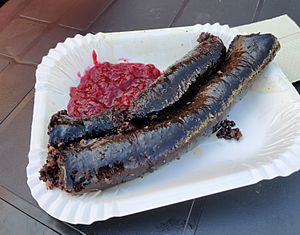
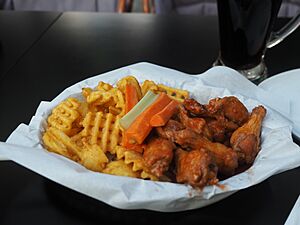
A special local food is mustamakkara, which means "black sausage." It's made from pork, pig's blood, and rye, and is often eaten with lingonberry jam. You can find it at kiosks in places like Tammelantori square.
Another Tampere tradition is munkki, which are fresh, sugary doughnuts. They are sold in many cafés, especially at the Pyynikki observation tower.
Tampere also has a local barbecue dish called peremech (pärämäts in Finnish). It's a pie with seasoned ground meat inside, similar to a Karelian pasty.
Since 1991, the two-day fish market event in Laukontori attracts many visitors. It's held in spring and autumn.
Music Scene
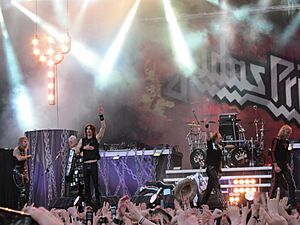
Tampere is home to the Tampere Philharmonic Orchestra, one of only two full-sized symphony orchestras in Finland. They perform classical, popular, and film music at the Tampere Hall. The Tampere Music Festivals organize international music events like the Tampere Jazz Happening.
Manserock is a term for rock music from Tampere with Finnish lyrics. It was very popular in the 1970s and 1980s, with bands like Popeda and Eppu Normaali. The first record company in Tampere, Poko Rekords, was founded in 1977.
Tampere has a lively rock and heavy metal scene. The Sauna Open Air Metal Festival is a big metal music event here. Bands like Negative and Uniklubi are from Tampere. The city also hosts an annual World of Tango Festival.
Theatre and Performances
Tampere has a long history of theater. There are famous theaters like Tampereen Työväen Teatteri and Tampereen Teatteri. Pyynikin Kesäteatteri is an open-air theater with Europe's oldest revolving stage. The Tampere Theatre Festival is an international event held every August. Tampere also has the Tampere Opera, founded in 1946.
Other theaters include Teatteri Siperia and Ahaa Teatteri, which specializes in plays for children and young people. There are also three cinemas in Tampere, including two Finnkino theaters.
Religious Activities
Most people in Tampere belong to the Evangelical Lutheran Church of Finland. There are many Lutheran churches, like Finlayson Church. Tampere also has other religious services, including English-speaking ones. The Catholic parish of the Holy Cross offers services in Finnish, Polish, and English.
There are three registered Muslim communities in Tampere. The largest is the Tampere Islam Society, with over 1,500 members.
Friendly Rivalry with Turku
Tampere has a fun, long-standing rivalry with the city of Turku, which was Finland's first capital. They often compete for the title of Finland's "second grand city" after Helsinki. This rivalry is mostly expressed through jokes about each other's food or local accents. Tampere is known for its food culture.
Main Sights and Attractions
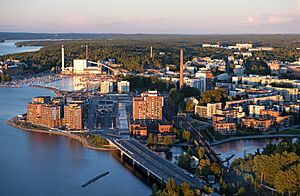
One of the main attractions is the Särkänniemi amusement park. It has the famous Näsinneula tower, which has a revolving restaurant at the top. Other interesting places include Tampere Cathedral, Tampere City Hall, the Tampere Central Library Metso, Kaleva Church, and the Tampere Hall for concerts. You can also visit the Tampere Market Hall and the historical Pyynikki observation tower.
Tampere has many hotels, including Hotel Tammer, Hotel Ilves, and Hotel Torni, which is the tallest hotel in Finland. The Holiday Club Tampere spa is also located by Lake Näsijärvi. There are many shopping centers in Tampere, such as Ratina and Koskikeskus.
Tampere is home to one of the last museums in the world about Vladimir Lenin. The museum is in the Tampere Workers' Hall, where Lenin met Joseph Stalin for the first time. The Tampere Lenin-museum closed on November 3, 2024, and reopened as Nootti (Note) in February 2025.
There are many museums and galleries, including:
- The Vapriikki Museum Centre, which has the Natural History Museum of Tampere, Finnish Hockey Hall of Fame, Finnish Museum of Games, and Post Museum.
- Hatanpää Manor and Hatanpää Arboretum.
- The Näsilinna Palace.
- Tampere Art Museum.
- The Moomin Museum, about the Moomins.
- Rupriikki Media Museum.
- Spy Museum in Siperia.
- Workers' housing museum in Amuri.
Pispala: A Unique Ridge Community
Pispala is a ridge located between Lake Pyhäjärvi and Lake Näsijärvi. It's divided into Ylä-Pispala ("Upper Pispala") and Ala-Pispala ("Lower Pispala"). It is the highest gravel ridge in the world, rising 80 meters above Lake Pyhäjärvi. In the past, it was where many factory workers lived. They could build their homes freely there. Pispala joined Tampere in 1937. Today, it's a residential area that is being updated, and it's an important historical part of Tampere.
Events and Festivals
Concerts and Music Events
Ratina Stadium in Tampere has hosted many big concerts. Bands like Nightwish, Iron Maiden, AC/DC, and Rammstein have performed there.
Tammerfest, Tampere's urban rock festival, takes place every July. Blockfest, held in the summer, is the largest hip hop event in the Nordic countries.
Sports in Tampere
Ice Hockey: The Heart of Tampere Sports
Ice hockey is very popular in Tampere. The first Finnish ice hockey match was played in Tampere on Lake Pyhäjärvi. Tampere is known as the hometown of Finnish ice hockey. Three great teams are from Tampere: Tappara, Ilves, and Koovee. Tappara and Ilves are among the most successful teams in Finland. Ilves was the first Tampere team to win the Finnish championship in 1936.
The Finnish ice hockey museum and the first ice hockey arena in Finland, the Hakametsä arena, are both in Tampere. A new main ice hockey arena, Tampere Deck Arena, opened on December 3, 2021. It was renamed Nokia Arena on November 19, 2021. The arena hosted the 1965 World Ice Hockey Championships, the 2022 IIHF World Championship, and the 2023 IIHF World Championship.
Football and Basketball
Football is also popular in Tampere. Ilves, Tampere's professional football club, has over 4,000 players in its teams. Tampere hosted some football games for the 1952 Summer Olympics.
Basketball is another popular sport. Tampere has three basketball teams. One of them, Tampereen Pyrintö, plays at the highest level and won the Finnish Championship in 2010, 2011, and 2014. Tampere was a co-host for EuroBasket 1967, and the Nokia Arena will host EuroBasket 2025.
Other Sports
Manse PP is the city's pesäpallo (Finnish baseball) team. They won the men's league in 2021 and the women's league in 2017. Tampere also has a baseball and softball club, the Tampere Tigers. The Tampere Saints are the city's American football club.
Motorcycle speedway has been held in Tampere at different places, including the Ratina Stadium. Tampere has a long tradition in gymnastics. The Finnish Gymnastics Federation office is located here.
Tampere has also hosted international sports events like the ICF Canoe Sprint World Championships and the World Rowing Junior Championships. In 2009, it hosted the 10th European Youth Olympic Festival. Tampere hosted the 2023 European Masters Games.
Getting Around: Transport in Tampere
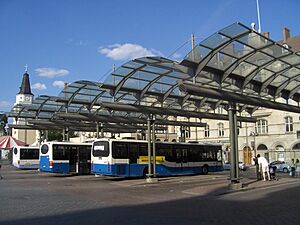
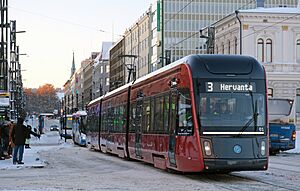
Tampere is an important railway hub in Finland. You can take direct trains to cities like Helsinki, Turku, and Oulu. About 150 trains arrive and depart from the Tampere Central Station every day. There are also many bus connections to places all over Finland.
The Tampere Ring Road is important for car traffic. It's part of Highway 3 and Highway 9. The western part of the ring road is one of the busiest roads in Finland outside the Helsinki area. The Tampere Tunnel is the longest road tunnel built in Finland for cars.
Tampere is served by Tampere–Pirkkala Airport, located about 13 kilometers southwest of the city. You can reach the airport by bus.
Tampere's public transport includes a bus network and two lines of the Tampere light rail, which started operating on August 9, 2021. The Tampere Bus Station was built in 1938 and was once the largest in the Nordic countries. From 1948 to 1976, the city also had a large trolleybus network.
The Port of Tampere, on the shores of Lake Näsijärvi and Lake Pyhäjärvi, was the busiest inland waterway in Finland for passengers in 2015. Many people take boats to Viikinsaari island for trips or cultural events.
Tampere has also worked to make cycling and walkability easier. Because of these efforts, the city was named "Cycling Municipality of the Year" in 2013. The number of people cycling has grown by about 2% each year.
Distances to Other Cities
City Government
In 2007, Tampere changed its government system. Now, a mayor and several deputy mayors are chosen for four-year terms by the city council. The mayor leads the city's activities.
Tampere was the first Finnish city to elect a mayor. The mayor and deputy mayors are trusted officials and can be removed by the council if they lose support.
Timo P. Nieminen was the mayor from 2007 to 2012. Anna-Kaisa Ikonen was elected mayor in 2013. From June 1, 2017, the number of deputy mayors changed from four to three. Lauri Lyly was mayor from 2017 to 2021. Anna-Kaisa Ikonen served again from 2021 to 2023. Kalervo Kummola was mayor from 2023 to 2025. The current mayor, Ilmari Nurminen, started his term in 2025.
Mayors of Tampere Over Time
- Kaarle Nordlund 1929–1943
- Sulo Typpö 1943–1957
- Erkki Lindfors 1957–1969
- Pekka Paavola 1969–1985
- Jarmo Rantanen 1985–2007
- Timo P. Nieminen (kok.) 2007–2012
- Anna-Kaisa Ikonen (kok.) 2013–2017
- Lauri Lyly (sd.) 2017–2021
- Anna-Kaisa Ikonen (kok.) 2021–2023
- Kalervo Kummola (kok.) 2023–2025
- Ilmari Nurminen (sd.) 2025–present
Famous People from Tampere
Born Before 1900
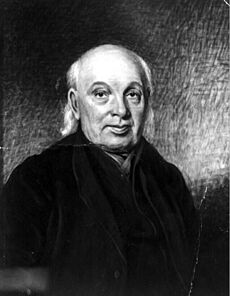
- Emil Aaltonen (1869–1949), factory owner and helper of good causes
- Minna Canth (1844–1897), author and social activist
- James Finlayson (1772–1852), Scottish factory owner who started the Finlayson company
- Wivi Lönn (1872–1966), architect
- Juho Kusti Paasikivi (1870–1956), a former Prime Minister of Finland and later the 7th President of Finland
- Frans Eemil Sillanpää (1888–1964), author and Nobel laureate
- Bertel Strömmer (1890–1962), architect
Born After 1900
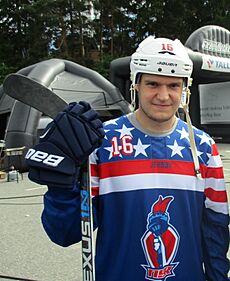
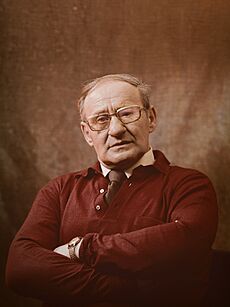
- Jonne Aaron (born 1983), singer
- Aleksander Barkov (born 1995), professional ice hockey player
- Anu Bradford (born 1975), Finnish-American author and law professor
- Anna Falchi (born 1972), Finnish-Italian model and actress
- Jussi Halla-aho (born 1971), politician
- Roope Hintz (born 1996), professional ice hockey player
- Seppo Jokinen (born 1949), author
- Glen Kamara (born 1995), professional footballer
- Kiira Korpi (born 1988), figure skater
- Patrik Laine (born 1998), professional ice hockey player
- Väinö Linna (1920–1992), author
- Sanna Marin (born 1985), former Prime Minister of Finland (2019–2023)
- Pate Mustajärvi (born 1956), rock singer
- Teppo Numminen (born 1968), professional ice hockey player
- Erika Vikman (born 1993), singer
International Connections
Tampere has "twin cities" or "sister cities" around the world. This means they have special friendly relationships.
- Chemnitz, Germany
- Essen, Germany
- Kaunas, Lithuania
- Kyiv, Ukraine
- Klaksvík, Faroe Islands
- Kópavogur, Iceland
- Linz, Austria
- Łódź, Poland
- Miskolc, Hungary
- Norrköping, Sweden
- Odense, Denmark
- Olomouc, Czech Republic
- Brașov, Romania
- Tartu, Estonia
- Trondheim, Norway
- Guangzhou, China
- Syracuse, United States
Tampere also has two "friendship cities":
Images for kids
See also
 In Spanish: Tampere para niños
In Spanish: Tampere para niños
 | Mary Eliza Mahoney |
 | Susie King Taylor |
 | Ida Gray |
 | Eliza Ann Grier |




